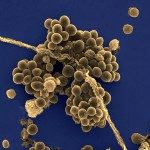Link to Pubmed [PMID] – 11524711
Clin. Infect. Dis. 2001 Sep;33 Suppl 3:S138-46
The major contribution of molecular biology to the study of antibiotic resistance has been the elucidation of nearly all biochemical mechanisms of resistance and the routes for dissemination of genetic information among bacteria. In this review, we consider the potential contribution of molecular biology to counteracting the evolution of resistant bacteria. In particular, we emphasize the fact that fundamental approaches have had direct practical effects on minimizing potential resistance: by improving interpretation of resistance phenotypes, by providing more adequate human therapy, by fostering more prudent use of antibiotics, and by allowing the rational design of new drugs that evade existing resistance mechanisms or address unexploited targets.

